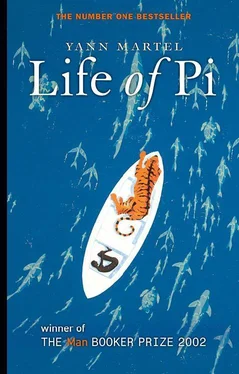Yann Martel - Life of Pi
Здесь есть возможность читать онлайн «Yann Martel - Life of Pi» весь текст электронной книги совершенно бесплатно (целиком полную версию без сокращений). В некоторых случаях можно слушать аудио, скачать через торрент в формате fb2 и присутствует краткое содержание. Год выпуска: 2002, ISBN: 2002, Издательство: Canongate Books, Жанр: Современная проза, на английском языке. Описание произведения, (предисловие) а так же отзывы посетителей доступны на портале библиотеки ЛибКат.
- Название:Life of Pi
- Автор:
- Издательство:Canongate Books
- Жанр:
- Год:2002
- ISBN:9781847674210
- Рейтинг книги:3 / 5. Голосов: 1
-
Избранное:Добавить в избранное
- Отзывы:
-
Ваша оценка:
- 60
- 1
- 2
- 3
- 4
- 5
Life of Pi: краткое содержание, описание и аннотация
Предлагаем к чтению аннотацию, описание, краткое содержание или предисловие (зависит от того, что написал сам автор книги «Life of Pi»). Если вы не нашли необходимую информацию о книге — напишите в комментариях, мы постараемся отыскать её.
Life of Pi — читать онлайн бесплатно полную книгу (весь текст) целиком
Ниже представлен текст книги, разбитый по страницам. Система сохранения места последней прочитанной страницы, позволяет с удобством читать онлайн бесплатно книгу «Life of Pi», без необходимости каждый раз заново искать на чём Вы остановились. Поставьте закладку, и сможете в любой момент перейти на страницу, на которой закончили чтение.
Интервал:
Закладка:
But let me pursue for a moment only one aspect of the question.
If you went to a home, kicked down the front door, chased the people who lived there out into the street and said, “Go! You are free! Free as a bird! Go! Go!”—do you think they would shout and dance for joy? They wouldn’t. Birds are not free. The people you’ve just evicted would sputter, “With what right do you throw us out? This is our home. We own it. We have lived here for years. We’re calling the police, you scoundrel.”
Don’t we say, “There’s no place like home”? That’s certainly what animals feel. Animals are territorial. That is the key to their minds. Only a familiar territory will allow them to fulfill the two relentless imperatives of the wild: the avoidance of enemies and the getting of food and water. A biologically sound zoo enclosure—whether cage, pit, moated island, corral, terrarium, aviary or aquarium—is just another territory, peculiar only in its size and in its proximity to human territory. That it is so much smaller than what it would be in nature stands to reason. Territories in the wild are large not as a matter of taste but of necessity. In a zoo, we do for animals what we have done for ourselves with houses: we bring together in a small space what in the wild is spread out. Whereas before for us the cave was here, the river over there, the hunting grounds a mile that way, the lookout next to it, the berries somewhere else—all of them infested with lions, snakes, ants, leeches and poison ivy—now the river flows through taps at hand’s reach and we can wash next to where we sleep, we can eat where we have cooked, and we can surround the whole with a protective wall and keep it clean and warm. A house is a compressed territory where our basic needs can be fulfilled close by and safely. A sound zoo enclosure is the equivalent for an animal (with the noteworthy absence of a fireplace or the like, present in every human habitation). Finding within it all the places it needs—a lookout, a place for resting, for eating and drinking, for bathing, for grooming, etc.—and finding that there is no need to go hunting, food appearing six days a week, an animal will take possession of its zoo space in the same way it would lay claim to a new space in the wild, exploring it and marking it out in the normal ways of its species, with sprays of urine perhaps. Once this moving-in ritual is done and the animal has settled, it will not feel like a nervous tenant, and even less like a prisoner, but rather like a landholder, and it will behave in the same way within its enclosure as it would in its territory in the wild, including defending it tooth and nail should it be invaded. Such an enclosure is subjectively neither better nor worse for an animal than its condition in the wild; so long as it fulfills the animal’s needs, a territory, natural or constructed, simply is , without judgment, a given, like the spots on a leopard. One might even argue that if an animal could choose with intelligence, it would opt for living in a zoo, since the major difference between a zoo and the wild is the absence of parasites and enemies and the abundance of food in the first, and their respective abundance and scarcity in the second. Think about it yourself. Would you rather be put up at the Ritz with free room service and unlimited access to a doctor or be homeless without a soul to care for you? But animals are incapable of such discernment. Within the limits of their nature, they make do with what they have.
A good zoo is a place of carefully worked-out coincidence: exactly where an animal says to us, “Stay out!” with its urine or other secretion, we say to it, “Stay in!” with our barriers. Under such conditions of diplomatic peace, all animals are content and we can relax and have a look at each other.
In the literature can be found legions of examples of animals that could escape but did not, or did and returned. There is the case of the chimpanzee whose cage door was left unlocked and had swung open. Increasingly anxious, the chimp began to shriek and to slam the door shut repeatedly—with a deafening clang each time—until the keeper, notified by a visitor, hurried over to remedy the situation. A herd of roe-deer in a European zoo stepped out of their corral when the gate was left open. Frightened by visitors, the deer bolted for the nearby forest, which had its own herd of wild roe-deer and could support more. Nonetheless, the zoo roe-deer quickly returned to their corral. In another zoo a worker was walking to his work site at an early hour, carrying planks of wood, when, to his horror, a bear emerged from the morning mist, heading straight for him at a confident pace. The man dropped the planks and ran for his life. The zoo staff immediately started searching for the escaped bear. They found it back in its enclosure, having climbed down into its pit the way it had climbed out, by way of a tree that had fallen over. It was thought that the noise of the planks of wood falling to the ground had frightened it.
But I don’t insist. I don’t mean to defend zoos. Close them all down if you want (and let us hope that what wildlife remains can survive in what is left of the natural world). I know zoos are no longer in people’s good graces. Religion faces the same problem. Certain illusions about freedom plague them both.
The Pondicherry Zoo doesn’t exist any more. Its pits are filled in, the cages torn down. I explore it now in the only place left for it, my memory.
CHAPTER 5
My name isn’t the end of the story about my name. When your name is Bob no one asks you, “How do you spell that?” Not so with Piscine Molitor Patel.
Some thought it was P. Singh and that I was a Sikh, and they wondered why I wasn’t wearing a turban.
In my university days I visited Montreal once with some friends. It fell to me to order pizzas one night. I couldn’t bear to have yet another French speaker guffawing at my name, so when the man on the phone asked, “Can I ’ave your name?” I said, “I am who I am.” Half an hour later two pizzas arrived for “Ian Hoolihan”.
It is true that those we meet can change us, sometimes so profoundly that we are not the same afterwards, even unto our names. Witness Simon who is called Peter, Matthew also known as Levi, Nathaniel who is also Bartholomew, Judas, not Iscariot, who took the name Thaddeus, Simeon who went by Niger, Saul who became Paul.
My Roman soldier stood in the schoolyard one morning when I was twelve. I had just arrived. He saw me and a flash of evil genius lit up his dull mind. He raised his arm, pointed at me and shouted, “It’s Pissing Patel!”
In a second everyone was laughing. It fell away as we filed into the class. I walked in last, wearing my crown of thorns.
The cruelty of children comes as news to no one. The words would waft across the yard to my ears, unprovoked, uncalled for: “Where’s Pissing? I’ve got to go.” Or: “You’re facing the wall. Are you Pissing?” Or something of the sort. I would freeze or, the contrary, pursue my activity, pretending not to have heard. The sound would disappear, but the hurt would linger, like the smell of piss long after it has evaporated.
Teachers started doing it too. It was the heat. As the day wore on, the geography lesson, which in the morning had been as compact as an oasis, started to stretch out like the Thar Desert; the history lesson, so alive when the day was young, became parched and dusty; the mathematics lesson, so precise at first, became muddled. In their afternoon fatigue, as they wiped their foreheads and the backs of their necks with their handkerchiefs, without meaning to offend or get a laugh, even teachers forgot the fresh aquatic promise of my name and distorted it in a shameful way. By nearly imperceptible modulations I could hear the change. It was as if their tongues were charioteers driving wild horses. They could manage well enough the first syllable, the Pea , but eventually the heat was too much and they lost control of their frothy-mouthed steeds and could no longer rein them in for the climb to the second syllable, the seen . Instead they plunged hell-bent into sing , and next time round, all was lost. My hand would be up to give an answer, and I would be acknowledged with a “Yes, Pissing.” Often the teacher wouldn’t realize what he had just called me. He would look at me wearily after a moment, wondering why I wasn’t coming out with the answer. And sometimes the class, as beaten down by the heat as he was, wouldn’t react either. Not a snicker or a smile. But I always heard the slur.
Читать дальшеИнтервал:
Закладка:
Похожие книги на «Life of Pi»
Представляем Вашему вниманию похожие книги на «Life of Pi» списком для выбора. Мы отобрали схожую по названию и смыслу литературу в надежде предоставить читателям больше вариантов отыскать новые, интересные, ещё непрочитанные произведения.
Обсуждение, отзывы о книге «Life of Pi» и просто собственные мнения читателей. Оставьте ваши комментарии, напишите, что Вы думаете о произведении, его смысле или главных героях. Укажите что конкретно понравилось, а что нет, и почему Вы так считаете.












